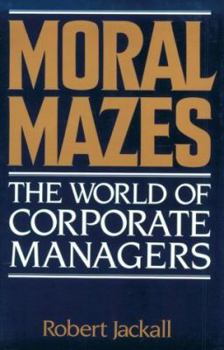Moral Mazes: The World of Corporate Managers
Select Format
Select Condition 
Book Overview
Robert Jackall's Moral Mazes offers an eye-opening account of how corporate managers think the world works, and how big organizations shape moral consciousness.
Based on extensive interviews with managers at every level of two industrial firms and of a large public relations agency, Moral Mazes takes the reader inside the intricate world of the corporation. Jackall reveals a world where hard work does not necessarily lead to success, but where...
Format:Paperback
Language:English
ISBN:0195060806
ISBN13:9780195060805
Release Date:September 1989
Publisher:Oxford University Press, USA
Length:249 Pages
Weight:0.98 lbs.
Dimensions:1.0" x 9.0" x 6.1"
Related Subjects
Biological Sciences Botany Business Business & Finance Business & Investing Business Ethics Consolidation & Merger Democracy Economics Ethics Ethics & Morality Ideologies & Doctrines Management Management & Leadership Philosophy Political Ideologies Political Science Politics & Government Politics & Social Sciences Popular Economics Science Science & Math Science & Scientists Science & TechnologyCustomer Reviews
3 ratings
bibliographic data :
Published by Thriftbooks.com User , 19 years ago
Author: Jackall, Robert. Title: Moral mazes : the world of corporate managers / Robert Jackall. Publisher: New York : Oxford University Press, 1988. Edition Date: 1988 Language: English Notes: Includes index. Physical Details: ix, 249 p. ; 25 cm. Subjects: Business ethics--United States. Executives--Professional ethics--United States. Corporations--Corrupt practices--United States.
Objective, sad, but true
Published by Thriftbooks.com User , 22 years ago
"Moral Mazes" is an extensive, award-winning and highly accurate sociological portrait of life in the modern corporation, an academic precursor, so to speak, of the "Dilbert" cartoon strip. Unlike many other writers on this topic, Jackall doesn't resort to Marxist rants, but rather, compares modern corporate culture to the "Protestant" work ethic most Americans are raised into.Jackall's inquiry, based on in-depth interviews with managers themselves, is broad in scope, and it is hard to generalize. Within about 200 pages, he covers the social circles of the corporation, cronyism, bad decisionmaking and public relations, to name a few. He discovers that corporations, at the upper levels at least, resemble a king's court more than a meritocratic organization. The essential work of a manager is not "management" or "leadership," but constantly making the right friends and adopting the correct posture. Anyone who has worked in such a setting, or knows people in such a field, will be able to relate instantly, although it can be argued that Jackall did not need to spend years of ethnographic research to reach this conclusion.This book is not for everyone, as Jackall must conclude that "ethics" as practiced by managers is nothing more than "survival" and ambition for one's own "advantage." While such a diagnosis may seem harsh, it is difficult to rationally explain recent events in the marketplace, such as the Enron scandal, without concluding that corporate executives have a moral compass that differs from that of the everyday person.Contrary to what a layman may think, Jackall makes no moral judgments of his own, although readers most certainly will. The title itself can be misinterpreted by people not familiar with sociology. The "morals" Jackall discusses are not ethics (which he attacks in his intro), but Durkheim's "occupational morality." While he does study corporations, he calls the focus of this study the "bureaucratic ethos" (not "corporate ethos"). Anyone who's read history (or the local newspaper) already knows bureacracy can create its own rules, from governments (i.e., the Nazis and the Holocaust) to religions (i.e., Catholicism and child molesters).Surprisingly, by portraying executives' lives as frought with anxiety, guilt, "senseless" work and no reliable means to measure their self worth, Jackall may cause an intelligent reader to actually feel sorry for them. Reading though his interviews with executives, there's little question that many executives began to regard him as a "Father Confessor" to admit their deeds.At the same time, Jackall offers an alternative theory for why the American work ethic has all but vanished: if people are promoted based soley on their manipulative social skills, why would anyone want to subscribe to the old work ethic?
Throughly depressing but an absolute must read
Published by Thriftbooks.com User , 26 years ago
This book ought to be required reading for all MBA candidates and would be corporate middle managers as an intro into the sad and dysfunctional but real corporate world. In numerous scenes that will be instantly familiar to anyone who has worked at a Fortune 200 firm the book recounts numerous instances of failed and misdirected management. Depressing because it reveals the underbelly of corporate America and capitalism but readable in its accurate portrayal. Occasionally at times slow (particularly towards the end when he presumably is tired of writing) it does a clinical autopsy on management. Like watching a train wreck you are compelled to keep reading even as you realize the denouement. If you think that ignorance is bliss - give this a miss - on the other hand, if you are a frustrated idealist and need proof that in order for evil to overcome good, good only has to do nothing, it is worth the investment. An excellent primer on why we need ethics courses but more importantly ethical actions.





